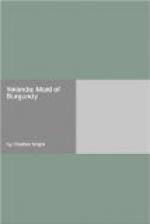Perched among the mountain crags, our castle was almost impregnable; but that was its only virtue as a dwelling-place. Bare walls, stone floors, sour wine, coarse boar’s meat, brown bread, and poor beds constituted our meagre portion.
Duke Frederick was poor because his people were poor. They lived among the rocks and crags, raised their goats, ploughed their tiny patches of thin earth, and gave to the duke and to each man his due. They were simple, bigoted, and honest to the heart’s core.
Though of mean fortune, Duke Frederick was the head of the great House of Hapsburg, whose founders lived in the morning mists of European history and dwelt proudly amid the peaks of their mountain home. Our castle in Styria was not the original Castle Hapsburg. That was built centuries before the time of this story, among the hawks’ crags of Aargau in Switzerland. It was lost by the House of Hapsburg many years before Max was born. The castle in Styria was its namesake.
To leaven the poor loaf of life in Castle Hapsburg, its inmates enjoyed the companionship of the kindest man and woman that ever graced a high estate—the Duke and Duchess of Styria. Though in their little court, life was rigid with the starch of ceremony, it was softened by the tenderness of love. All that Duke Frederick asked from his subjects was a bare livelihood and a strict observance of ceremonious conventions. Those who approached him and his son did so with uncovered head and bended knee. An act of personal familiarity would have been looked on as high treason. Taxes might remain unpaid, laws might be broken, and there was mercy in the ducal heart; but a flaw in ceremony was unpardonable.
The boar’s meat and the brown bread were eaten in state; the sour wine was drunk solemnly; and going to bed each night was an act of national importance. Such had been the life of this house for generations, and good Duke Frederick neither would nor could break away from it.
Of all these painful conditions young Max was a suffering victim. Did he sally forth to stick a wild boar or to kill a bear, the Master of the Hunt rode beside him in a gaudy, faded uniform. Fore-riders preceded him, and after-riders followed. He was almost compelled to hunt by proxy, and he considered himself lucky to be in at the death. The bear, of course, was officially killed by Maximilian, Count of Hapsburg, no matter what hand dealt the blow. Maximilian, being the heir of Hapsburg, must always move with a slow dignity becoming his exalted station. He must, if possible, always act through an officer; I verily believe that Duke Frederick, his father, regretted the humiliating necessity of eating his own dinner.
Poor Max did not really live; he was an automaton.
Once every year Duke Frederick gave a tournament, the cost of which, in entertainments and prizes, consumed fully two-thirds of his annual income. On these occasions punctilious ceremony took the place of rich wine, and a stiff, kindly welcome did service as a feast. These tournaments were rare events for Max; they gave him a day of partial rest from his strait-jacket life at the little court among the crags.




